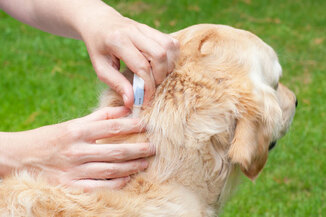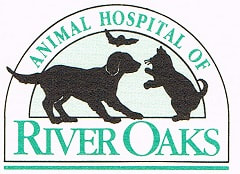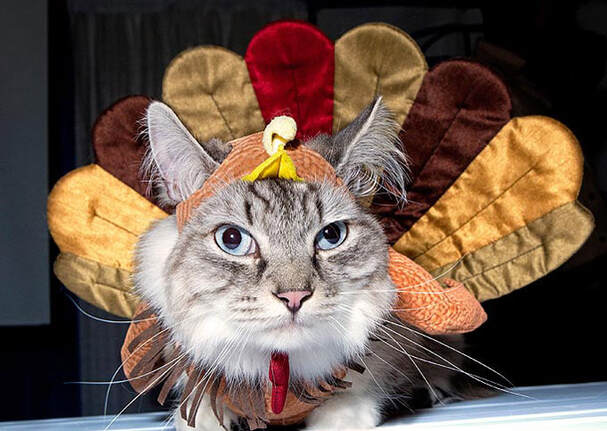|
A collection of Halloween pointers Halloween can present many dangers to our pet family members. Costumes, noises and candy can make Halloween a frightening night for pets. 1. Keep pets away from the candy bowl Not only is chocolate a major toxin for dogs, (and cats), but over the years we have seen many pets ingest not only the candy, but also the entire wrapper. Hard candies and lollipop sticks are also choke hazards as they can get lodged in pets’ throats, stomachs and intestinal tracts. If you suspect your pet has taken a treat from your Halloween haul, monitor him or her for appetite loss, vomiting, diarrhea, increased heart or respiratory rates, tremors, and call us or the local veterinary emergency hospital immediately if you witness any of these signs. 2. Use pet-friendly treats Include your dog and cat in the trick-or-treating fun by giving him or her a special treat made for pets. We have numerous and varied treats here in the hospital that you can choose from, designed for their best health, taking into account their weight and medical needs. Squeaky pumpkin-shaped toys are also a great option to keep Fido entertained while you sort out candy with the kids. 3. Use caution when dressing up Dressing up your cat or dog for Halloween can be plenty of fun, but bear in mind that safety should be a major priority when choosing a pet costume. Neck, leg and tail openings should be large enough to allow movement, and Velcro and elastics shouldn’t be so tight that they rub or pinch your pet’s skin. We have treated patients in the past for serious lacerations that have occurred because of elastics being too tight, disturbing blood circulation. Allow a two-finger width space between the costume and your pet’s neck to ensure unrestricted airflow and make sure there’s nothing obstructing his or her vision. Remember to always keep a close eye on costumed pets. If they seem uncomfortable about their new disguise and are trying to scratch, chew or tear their way out of the costume, remove the costume immediately. 4. Remove choking hazards from costumes Inspect your pet’s costume for dangling ties that they might trip over and remove any sequins or bobbles that can be chewed on. Swallowed pieces of costumes can cause serious and potentially life threatening intestinal blockages. 5. Remember Pet identification Always make sure your dog or cat has proper identification in case they accidentally escape into the night. While veterinarians and humane societies all have microchip scanners, your neighbours do not. Ensuring your pet has a collar with their name and your contact information on it increases the chances they will be returned to you in the event he or she becomes lost. Also remember that you can register your pet on line with the QR code that is on our rabies tag, linked to a website designed to help your lost pet find their way home. 6. Know when to take furry trick-or-treaters home Taking your dog trick-or-treating can be fun, but some pets may find the excitement of the evening too much, leading to nervousness and possible problems. If you do take your dog trick-or-treating with your children, monitor closely, and if you do see any signs of anxiousness please do turn around and take them home right away. 7. Walk safely Keep your dog on a short leash while trick-or-treating and make him or her visible by adding reflective tape to the costume or a collar with LED lights. If your dog is a smaller breed, do keep an eye out to make sure they do not accidentally get stepped on by busy trick-or-treaters! 8. Give pets a safe room Pets who are at home during the Halloween evening can become agitated by the doorbell constantly ringing and the commotion associated with all of the visiting children. You may want to consider a quiet room, away from the noise of the front door. Include your pet’s essentials in the room: food, water, toys and a litter box for cats. Playing soft gentle music for them in this room can also have a calming effect. If you have observed in previous years that your pet gets quite anxious during Halloween night, please ask to speak with Dr. Gold about the options available. We have natural products that can help to reduce anxiety, which can be dispensed when appropriate. We even have specially made cat food available that can naturally calm anxious cats. 9. Bring outdoor cats inside - it is safer, and it is the law Your cat may love to prowl outdoors, but Halloween night can contain too many dangers to allow cats to wander. The noise and excitement on the street can be overwhelming and cause them to run off and get lost. While the occasional cat may not be happy about staying indoors, their well-being is more important than missing a midnight jaunt. Oakville has a bylaw that bans cats from wondering on their own outside, for good reason. 10. Make decorations pet-friendly Using a battery operated light instead of a candle can greatly enhance safety for your pet, by avoiding curiosity caused burns as well as accidental house fires which can be caused by a pet knocking over lit candles. Any decoration that can be chewed or swallowed should be kept out of reach of all pets. If you have any questions at all about your pets, please do not hesitate to call us at 905-338-6257.
16 Comments
Hospital Closed on Thanksgiving - October 14Just a quick reminder that the Animal Hospital is closed for the Thanksgiving statutory holiday (October 14) and Dr. Gold is not in the office on Saturday October 12. Make sure to pick up food and medications and book an appointment for any medical concerns prior to the long weekend.
Should your pet need medical assistance during this time, please contact the Mississauga/Oakville Veterinary Emergency Hospital at 905-829-9444. They are located at 2285 Bristol Circle, which is at the intersection of Upper Middle Road and Winston Churchill Blvd North. They are open 24 hours. Heartworm medication is due again! Heartworm feels like a summer disease but mosquitoes are prolific right through September and don't fully taper off until November. That means transmission of heartworm disease can continue to occur as late as November. Ticks and fleas are also still very active at this time of year. Today is the day to give another dose of the heartworm, flea and tick preventative medication prescribed by your veterinarian. Remember with the transdermal (liquid applied to skin) medications that you need wait at least four hours before giving a bath or letting the animal go outside in the rain. |
Our creative team at the Animal Hospital of River Oaks take pride in providing educational information as well as keeping our River Oaks's Families well informed in up-coming events happening at the hospital! Archives
June 2020
Categorieshttps://api.pethealthnetworkpro.com/v1/practices/9b0cebb5-40b2-8d36-d4c2-60de940a795b/survey-responses
|
|
Our Practice:
Animal Hospital of River Oaks 161 Old Upper Middle Rd Oakville, ON L6H 1M2 P: 905-338-6257 905-338-0267 [email protected] Follow us on: FACEBOOK - we have a lot of fun pictures and videos, so please click below on the "f" for a link to our facebook page, and enjoy! Site powered by Weebly. Managed by IDEXX Laboratories
|


